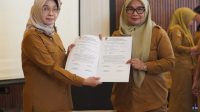THE ARRANGEMENT of tents and the placement of temporary shelters or refugee camps for victims of the earthquake, tsunami and liquefaction in Palu, Sigi and Donggala that are less precise and not gender-representative can be one of the factors ausing gender based violence.
“The inappropriate arrangement of refugee camps can increase the risk of gender based violence,” said Expert Staff for Governance and Law, Norma Mardjanu, in her remarks at the coordination meeting on the protection of women and children in the disaster, in Palu, Tuesday (6/18/2019) .
Se added that the arrangement of toilets and bathrooms, as well as other facilities in refugee camps that were less safe, could provoke sexual violence against women and children.
In addition, violence can also occur, she said, because the aid distribution mechanism does not pay attention to vulnerable groups and others.
Related to this condition, a multisectoral approach is needed to prevent and deal with gender based violence in disaster situations.
In a disaster situation, the risk of gender-based violence will increase due to several factors, such as disrupted social protection systems, separate families, weak security and safety rules, especially in conflict-prone shelters in refugee camps.
She said that the gender-based protection of women’s and children’s rights clusters in IDPs needs to be established, to ensure prevention and handling efforts can be carried out in disaster situations in refugee camps.
This cluster is a follow-up of national clusters in which there are eight clusters in disasters including education, health, search and rescue, logistics and equipment, evacuation and protection, facilities and infrastructure, economy, and early recovery.
The speaker, the Expert Staff for Poverty Reduction at the Ministry of Women’s Empowerment and Protection of Indonesian Children, Titi Eko, said that men and boys could also be victims of BECs. “So not only women and girls experience it,” said expert staff Titi Eko.
Se added that 2 of the 3 Indonesian girls experienced violence each year according to the results of the 2018 Child and Youth Life Experience survey.**
Source: Humpro Central Sulawesi










